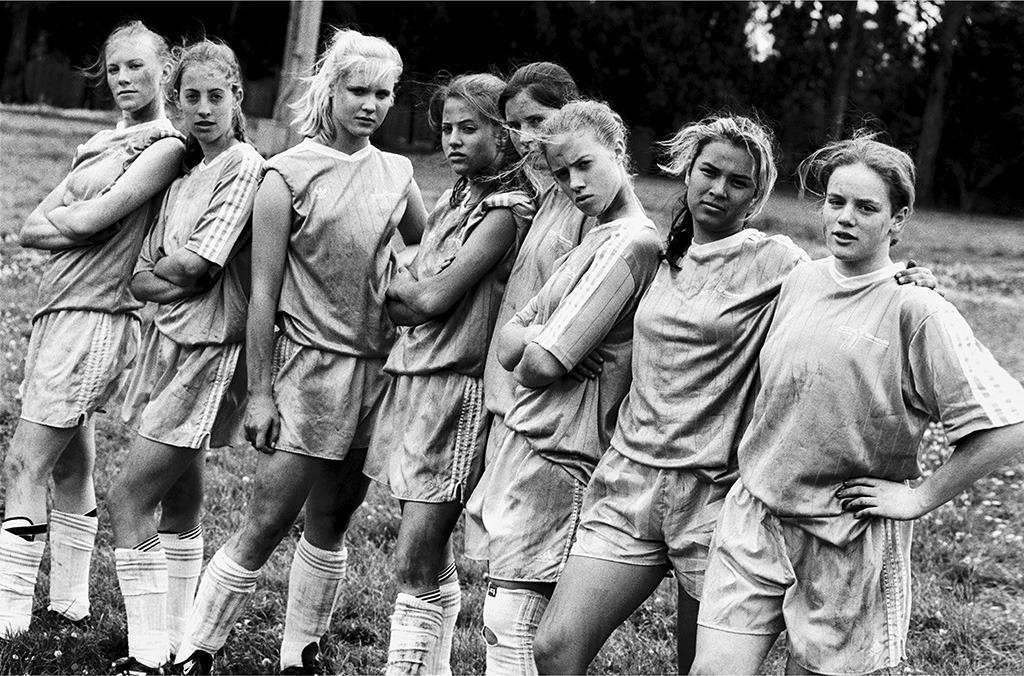How Ads Are Challenging the Stereotype That Women Aren’t Good at Sports

New ads remind everyone that playing like a girl isn’t an insult. (Photo: Gallery Stock)
“She’s fine as hell.” “No way to gain the freshman 15 when you’re running up and down a soccer field.” “Just look for the girl wearing the extremely short shorts.”
If you’re a New York City resident, you might notice sexist comments like the ones above scrolling across a billboard in Times Square this morning. Launching this week, Dove’s new #MyBeautyMySay is collecting and posting real remarks made by the media in an effort to encourage girls to change the conversation about women in sports.
When the camera lens seems to focus more on a female athlete’s looks than her talent, we’re taking away some of the remarkable effects of sports, says Jess Weiner, a confidence expert, CEO of Talk to Jess LLC, and Dove’s global self-esteem ambassador. “The #MyBeautyMySay campaign is designed to help girls see that they can challenge the harmful commentary that they hear from the media about women’s bodies,” Weiner tells Yahoo Beauty about the new campaign site on which women can actually respond to these body critics. “This is so important when we particularly think about women and athletics.”
Tough & Beautiful: Female Farmers Defy Stereotypes
Weiner says Dove’s research has shown that 8 in 10 girls with low body-related self-esteem are more likely to stop participating in activities they love, including sports, if they don’t feel good about the way they look. So when people comment on the a woman’s body shape or pretty face instead of her skill and purpose, even sports becomes a vehicle for women to be watched instead of to stay healthy, compete, and build important life skills.
According to Art Markman, PhD, a professor of psychology at the University of Texas, Austin, women have a harder time finding their place in the sports world than men do; this is because most athletic events have historically been male competitions. “As a result, there was an initial stereotype that women who were involved in sports were more masculine than women who did not,” he tells Yahoo Beauty.
This is why women like race car driver Danica Patrick and MMA fighter Ronda Rousey have garnered so much attention; they don’t fit the stereotype, and therefore they’re often lauded as much for the look of their bodies as for their skill. “There are certain expectations people carry, often implicitly, that lead to surprise when they are violated,” Markman says. “Athletes who are physically beautiful get attention from the media partly because beautiful women often get attention from the media, and then additionally because beautiful female athletes defy expectation.”
What Makes Somebody Beautiful? Provocative New Images Challenge the Definition
Markman also says many of us still hold onto the long-ingrained notions that female sports aren’t as competitive as male sports and that women athletes are not as talented as males – even if it’s not true. “There was also a tendency to ‘protect’ women from certain sports,” Markman says of the dainty, delicate, and fragile cliché. “To this day, women and girls don’t have organized football leagues in colleges and schools, and for years ‘throw like a girl’ was a playground insult.”
Lately, ad campaigns have been looking to build up women and their capabilities, especially among females who defy our expectations. Nike’s new ad featuring female Indian athletes is one such example, along with Bodyform’s recent ad insisting that “no blood should hold us back and equating menstruation to some of women’s bloodiest battles in various sporting arenas, and Sport England’s “This Girl Can” ad, which inspired millions of women to exercise.
Finally, after original Always #LikeAGirl ad caused an amazing firestorm during the Super Bowl in 2015, the brand followed its success with yet another TV spot featuring young girls engaging in physically tough sports, such as rugby, boxing, weightlifting, and shot-put, this summer leading up to the Olympics.
According to Markman, these ads are busting apart stigmas and stereotypes that may hold women back from achieving their potential, because sports are crucial for building key life skills like teamwork and perseverance. “The first step toward eliminating a stereotype is to acknowledge that it exists and to make it explicit, as many of the stereotypes people hold are implicit,” he explains. “They bias the way people interpret information without their awareness, and people cannot correct for this bias until they are aware that it exists.”
#LikeAGirl Super Bowl Ad Tops Twitter, Spurs Haters
Now, we’re beginning to recognize these biases and push for better messages. Weiner says Dove is hoping that the headlines coming out of Rio in August will include messages that are uplifting about the women who compete in the Games — and the young girls who watch them. “The #MyBeautyMySay challenges us to ask ourselves what we notice more, a swimmer’s bathing suit or that she just broke a world record,” Weiner says. “We can show women and girls that it is possible to be noticed because of your accomplishments, not your looks.”
That’s a goal we can all embrace leading into the 2016 Olympics and beyond.
Let’s keep in touch! Follow Yahoo Beauty on Facebook, Twitter, Instagram, and Pinterest.

